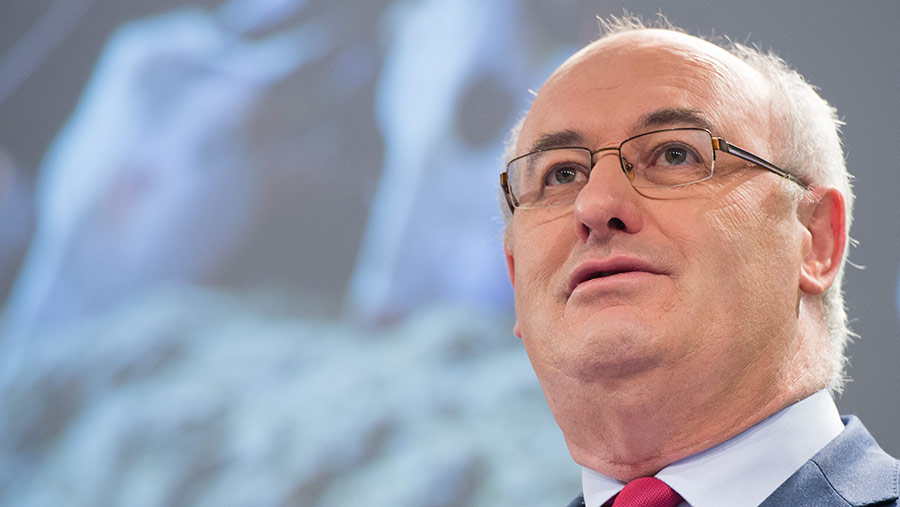‘Focus on supply to ease milk price pain’ – EU commissioner Hogan
 Phil Hogan. ©Isopix/RexShutterstock
Phil Hogan. ©Isopix/RexShutterstock Limited demand for dairy products means producers should focus on reducing supplies to ease the pain of low milk prices, EU farm commissioner Phil Hogan has told farmers.
“Opportunities for increased demand are limited,” said Mr Hogan . “Accordingly, more focus must come on the supply side.”
Total private storage aid and public intervention support had covered 2.8m tonnes of dairy products last year – at a time when EU production increased by 3.5m tonnes.
In a bid to help producers, Brussels since announced a range of measures, said Mr Hogan. This included an aid package for producers and measures to take milk off the market.
“We have now effectively deployed all of the tools available in the CAP toolkit.”
See also: What is Article 222 and can it save dairy?
Controversially, these measures include giving producers permission to get together and agree to curtail milk output – something which would usually breach EU competition rules.
Mr Hogan believes such a measure – known as activating Article 222 – could play a significant role in rebalancing the market.
But industry leaders in countries such as the UK argue that any reduction in dairy output would simply be offset by farmers increasing production elsewhere.
Mr Hogan said: “This is a voluntary instrument and its use depends ultimately on producers and is now genuinely in the hands of dairy farmers who may, if they so wish, join forces and collectively decide to reduce production.”
More action needed
Mansel Raymond, dairy chairman of the EU farm umbrella organisation Copa Cogeca, said more action was needed to address the sector’s short-term problems.
Mr Raymond said he was disappointed that EU member states had paid out only about half the aid made available by Brussels under the first EU crisis package.
Article 222 was not being used because there were no financial incentives for it, suggested Mr Raymond. Delays in direct payments were also causing problems for farmers.
“Possible EU financing should not affect the crisis reserve,” said Mr Raymond. “Producers need their fair share of the margins through the food supply chain.”
With little sign of prospects improving, Mr Hogan said the European Commission would again increase the amount of skimmed milk powder taken off the dairy market.
A EU ceiling for buying in 109,000t of skimmed milk powder at a fixed price was reached on 31 March. A doubled ceiling of 218,000t was reached this week.
Brussels is now proposing a further increase in the ceilings of up to 350,000t.
‘Stop meddling’
But UKIP MEP Stuart Agnew said governments should not be meddling in the dairy market.
“Public policy should not aim to control prices, but to help farmers develop resilience to manage the risks,” said Mr Agnew.
“Governments should really only be thinking of helping to overcome catastrophic and extreme events on farms – such as floods or drought – and not meddling in pricing or controlling supply or demand.”
The 2015 dairy support package was just tokenism – a gesture worth £1,500 to each UK dairy farmer, said Mr Agnew.
“Farmers have always been willing to expand production to match increasing demand. A willingness to recognise that there is too much milk is now required.”
Compensation
Campaigning dairy farmers claim 70% of producers would curtail their milk output, if they were compensated to do so.
The online survey, which gathered 381 responses, was conducted by the pressure group Fair Price Farming Northern Ireland.
Some 63% of farmers were prepared to maintain milk output at current prices, with 16% prepared to increase production, and 19% prepared to reduce output or disperse their herd.
But 60% of survey respondents said they agreed with Mr Hogan that a collective reduction of supply across the EU would increase their milk price.
